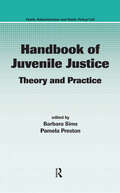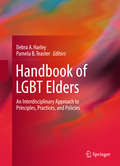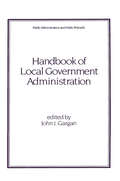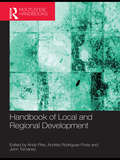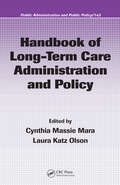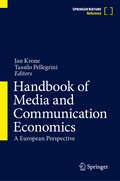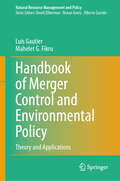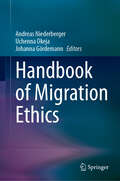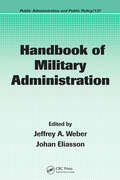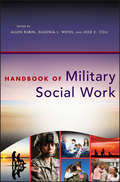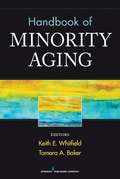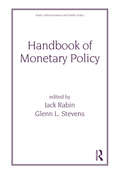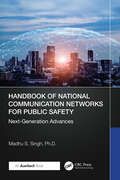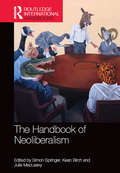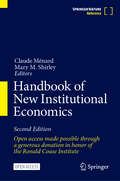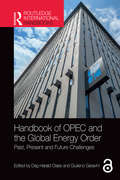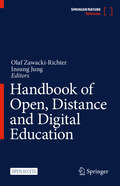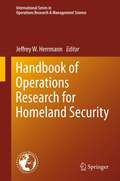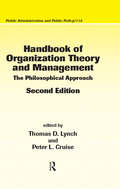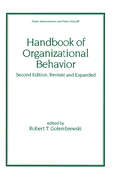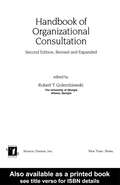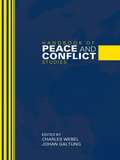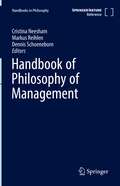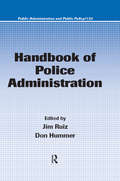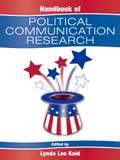- Table View
- List View
Handbook of Juvenile Justice: Theory and Practice (Public Administration and Public Policy)
by Barbara Sims Pamela PrestonToo often professionals in public policy or criminal justice must scramble to find additional reading on juvenile law and justice or on juvenile delinquency topics because most references and textbooks provide inadequate coverage of many issues of importance. The Handbook of Juvenile Justice: Theory and Practice responds to this need by prov
Handbook of LGBT Elders
by Debra A. Harley Pamela B. TeasterThis groundbreaking resource presents a wealth of findings and perspectives previously unseen in the LGBT literature. Its focus on psychological, sociopolitical and care delivery issues affecting LGBT elders reveals both the nuanced interplay between diverse sources of identity and multiple sources of stigma and discrimination. Specific chapters highlight challenges and resiliencies impacting subpopulations (e. g. , racial groups, veterans, immigrants), examine employment and advocacy issues, discuss later-life concerns in context and offer guidelines for relevant, ethical practice. Contributors represent a wide range of fields from psychiatry and gerontology to public health and public policy, reflecting the scope and needs of this diverse and complex population. Among the topics in the Handbook: Family relationships of older LGBT adults. The intersection of identities: race, age, sexuality and care network. Bisexuality: an invisible community among LGBT elders. Implications of the Supreme Court ruling on same-sex marriage. No money, no work and you're old. Disabilities among LGBT elders: responses of medicine, public health, rehabilitation and social work. Handbook of LGBT Elders is an essential reference for mental health professionals, psychologists and social workers who work with the LGBT community and the elderly, as well as researchers interested in the LGBT community and aging.
Handbook of Local Government Administration
by John J. GarganThis theoretically and experientially grounded reference provides a complete overview of the principles and applications of government administration and management practices in the local public sector. Written by over 25 distinguished academics and professionals with substantial experience as practitioners and consultants of administrative operations to local governments, the book covers the effects of environmental conditions on local administrators and management techniques to administration in different types of local government. It helps readers reduce research time by presenting advanced materials on local government administration and management in a single source.
Handbook of Local and Regional Development
by Andy PikeThe Handbook of Local and Regional Development provides a comprehensive statement and reference point for local and regional development. The scope of this Handbook’s coverage and contributions engages with and reflects upon the politics and policy of how we think about and practise local and regional development, encouraging dialogue across the disciplinary barriers between notions of ‘local and regional development’ in the Global North and ‘development studies’ in the Global South. This Handbook is organized into seven inter-related sections, with an introductory chapter setting out the rationale, aims and structure of the Handbook. Section one situates local and regional development in its global context. Section two establishes the key issues in understanding the principles and values that help us define what is meant by local and regional development. Section three critically reviews the current diversity and variety of conceptual and theoretical approaches to local and regional development. Section four address questions of government and governance. Section five connects critically with the array of contemporary approaches to local and regional development policy. Section six is an explicitly global review of perspectives on local and regional development from Africa, Asia-Pacific, Europe, Latin America and North America. Section seven provides reflection and discussion of the futures for local and regional development in an international and multidisciplinary context. With over forty contributions from leading international scholars in the field, this Handbook provides critical reviews and appraisals of current state-of-the-art conceptual and theoretical approaches and future developments in local and regional development.
Handbook of Long-Term Care Administration and Policy (Public Administration and Public Policy)
by Laura Katz Olson Cynthia Massie MaraAttitudes toward long-term care contain a strong residue of negativity in today‘s society and current problems with the system augment such perceptions. Unless dealt with now, this will only get worse, as the 85-and-older crowd is the fastest growing part of the population, and the first wave of Baby Boomers is approaching 60. Exploring and delinea
Handbook of Media and Communication Economics: A European Perspective
by Jan Krone Tassilo PellegriniThis handbook maps the media economy in its entirety against the background of the advancing digitalization of communication, media production, media distribution and the adaptation of regulatory framework conditions from different disciplinary approaches. It provides an integrated view on digitally induced economic transformations of the European media sector, and gives an explicitly European perspective on media economics – challenging the dominant US-American view.Topics covered include, but are not limited to: Theoretical approaches to media economics; media technologies and data management in media economics; building blocks of the media industry; media types and core distribution markets; system aspects and communication culture; media systems and regulatory policy; as well as methods of media economics.The handbook is a must-read for students, teachers and researchers in media and communication economics and science,as well as practicioners and policy-makers at the nexus of media, business and politics.
Handbook of Merger Control and Environmental Policy: Theory and Applications (Natural Resource Management and Policy #59)
by Luis Gautier Mahelet G. FikruThis book presents an integrated theory of firms’ strategies and two types of policies, namely environmental policies, and merger control policies. It develops a framework to examine the intricate relationship between merger and acquisition (M&A) incentives, merger control policy, environmental policies, and firms’ sustainability practices. The chapters highlight the importance of policy coordination to underscore the link between M&A and environmental externality, and the link between merger policy and environmental policy. Drawing together related fields that are seldom linked in the literature, this volume offers a comprehensive and authoritative reference for scholars, graduate students, and policymakers.
Handbook of Migration Ethics
by Andreas Niederberger Uchenna Okeja Johanna GördemannThis book provides a comprehensive overview of the state-of-the-art literature on migration ethics. The ethics of migration is one of the rapidly growing fields of research in political philosophy, applied ethics, political theory, legal theory, social philosophy and the study of migration in the wider social sciences. Approaches in this field have elaborated possible rights of migrants and host societies, debated permissible criteria for immigration policies, and considered the differences between the claims that refugees and other migrants can make. This Handbook brings together leading international philosophers and social scientists from all regions of the world. In its contributions, it retraces the historical and systematic evolution of normative positions on migration and asylum, introduces the methodologies used in this field and offers concise analyses of the most important controversies in the field of migration – and in particular in the current politically important debate on the ethics of refugees and asylum. The Handbook of Migration Ethics is an indispensable resource for academics, students as well as professionals working in the field of migration. It constitutes a useful starting point for understanding research in this field and its social and political significance, as well as for discovering future research topics.
Handbook of Military Administration (Public Administration and Public Policy)
by Jeffrey A. Weber Johan EliassonWhile policy makers are perpetually conceptualizing new reform packages, the actual enactment of those reforms is typically more challenging. Remarkably, the one public institution that is able to meet that challenge is also the largest. The United States Department of Defense, which employs over 600,000 people and deals with $500 billion in fundin
Handbook of Military Social Work
by Allen Rubin Eugenia L. Weiss Jose E. CollThe need has never been more crucial for community health providers, programs, and organizations to have access to training in addressing the unique behavioral health challenges facing our veterans, active duty military, and their families. Handbook of Military Social Work is edited by renowned leaders in the field, with contributions from social work professionals drawing from their wealth of experience working with veterans, active duty military, and their families. Handbook of Military Social Work considers: Military culture and diversity Women in the military Posttraumatic stress disorder in veterans Traumatic brain injury in the military Suicide in the military Homelessness among veterans Cycles of deployment and family well-being Grief, loss, and bereavement in military families Interventions for military children and youth Offering thoughtful advice covering the spectrum of issues encountered by mental health professionals working with individuals and families, Handbook of Military Social Work will contribute to the improvement of efforts to help our military personnel, veterans, and their families deal with the challenges they face.
Handbook of Minority Aging
by Keith E. Whitfield Tamara A. BakerThe book focuses on the needs of four major ethnic groups: Asian/Pacific Islander, Hispanic/Latino, African American, and Native American. Key Features: Provides current, comprehensive information about minority aging through a multidisciplinary lens, Integrates information from scholars in gerontology, anthropology, psychology, public health, sociology, social work, biology, medicine, and nursing, Emphasizes the principal public health issues concerning minority elders, Offers "one-stop shopping" regarding the development of a substantial knowledge base about minority aging, Includes recent progressive research pertaining to the social, cultural, psychological and health needs of elderly minority adults in the US.
Handbook of Monetary Policy
by Jack Rabin Glenn L. StevensThis handbook explains the development and implementation of monetary policy. It examines theories and issues related to the preservation of economic activity and explores why the preservation of economic stability is a principal goal of public policy.
Handbook of National Communication Networks for Public Safety Next-Generation Advances: Next-Generation Advances
by Madhu S. Singh, Ph.D.The U.S. Department of Homeland Security created the FirstNet Authority for the purpose of building and operating a nationwide public safety broadband network. Handbook of National Communication Networks for Public Safety: Next-Generation Advances traces the evolution of the National Public Safety Broadband Network (NPSBN). The book is composed of three major sections, each section containg specific contents: Advent of FirstNet National Public Safety Broadband Network Evolution of National Public Safety Broadband Network (NPSBN) Future Innovations, Opportunities, and Challenges in Public Safety The book covers planning, architecting/designing of networks and services, deployment, and operations, as well as enhancements to cover all states and territories of the United States. Other highlights covered in the book include: 4G/ 5G/ 6G mobile broadband technology The FirstNet and NPSBN ecosystem The dedicated and secure public safety network for first responders Terrestrial and satellite based broadband network and services for public safety 911 and location-based services Quality of service Cybersecurity AI/AR opportunities, network interoperability and challenges The book features technical details of the NPSBN and services. It explains how enhanced devices make the NPSBN accessible anywhere and anytime to public safety personnel over dedicated and secure LTE/ 5G networks. It discusses how public safety challenges differ from urban to rural areas, from mainland to U.S. territories, and from land to sea coverage. The book concludes with an analysis on future challenges and presents approaches for successful resolution of these issues.
Handbook of Neoliberalism
by Simon Springer Kean Birch Julie MacLeavyNeoliberalism is easily one of the most powerful discourses toemerge within the social sciences in the last two decades, and the number of scholars who write about this dynamic and unfolding process of socio-spatial transformation isastonishing. Even more surprising though is that there has, until now, not been an attempt to provide a wide-ranging volume that engages with the multiple registers in which neoliberalism has evolved. The Routledge Handbook of Neoliberalism seeks to offer a comprehensive overview of the phenomenon of neoliberalism by examining the range of ways that it has been theorized, promoted, critiqued, and put into practice in a variety of geographical locations and institutional frameworks. With contributions from over 50 leadingauthors working at institutions around the world the volumes seven sections will offer a systematic overview of neoliberalism’s origins, political implications, social tensions, spaces, natures and environments, and aftermaths in addressing ongoing and emerging debates. The volume aims to provide the first comprehensive overview of the field and to advance the established and emergent debates in a field that has grown exponentially over the past two decades, coinciding with the meteoric rise of neoliberalism as a hegemonic ideology, state form, policy and program, and governmentality. It includes a substantive introductory chapter and will serve as an invaluable resource for undergraduates, graduate students, and professional scholars alike.
Handbook of New Institutional Economics
by Claude Ménard Mary M. ShirleyThis Open Access Handbook of New Institutional Economics (NIE) is a comprehensive reference work providing a unique and timely overview of recent developments and broad orientations in institutional analysis. This second edition has been thoroughly updated and extended, including 23 new chapters on political and legal institutions, organizations and contracts, regulation, culture, methodology and institutional change. Chapters have been written by highly respected scientists in the field, among them Ronald Coase, Douglass North, Elinor Ostrom, Oliver Williamson and Roger Myerson, all Nobel recipients, as well as by numerous other foremost NIE specialists at the frontier of NIE research. This Handbook gives students and young researchers an introduction to the topic and offers all scholars a reference book for their research. It will also be of interest to economists, political scientists, legal scholars, management specialists, sociologists, and others wishing to learn more about these important subjects and gain insight into progress made by institutionalists from other disciplines. Open access made possible through a generous donation in honor of the Ronald Coase Institute.
Handbook of OPEC and the Global Energy Order: Past, Present and Future Challenges (Routledge International Handbooks)
by Dag Harald Claes Giuliano GaraviniThe Organization of the Petroleum Exporting Countries (OPEC), celebrating its 60th anniversary in 2020, is one of the most recognizable acronyms in international politics. The organization has undergone decades of changing importance, from political irrelevance to the spotlight of world attention and back; and from economic boom for its members to deep political and financial crisis. This handbook, with chapters provided by scholars and analysts from different backgrounds and specializations, discusses and analyzes the history and development of OPEC, its global importance, and the role it has played, and still plays, in the global energy market. Part I focuses on the relationship between OPEC and its member states. Part II examines the relationship between OPEC and its customers, the consuming countries and their governments, while Part III addresses the relationship between OPEC and its competitors and potential partners, the non-OPEC producers, and the international oil companies. The final section, Part IV, looks at OPEC and the governance of international energy.
Handbook of Open, Distance and Digital Education
by Insung Jung Olaf Zawacki-RichterThis open access handbook offers a one-stop-shop for both new and established researchers, educators, policy makers and administrators in the field of open, distance and digital education (ODDE) to gain a comprehensive overview of the history, theory and practice at all levels of ODDE, and at the same time stimulates in-depth discussions on various themes and issues of ODDE for today and future. Researchers, scholars and students in the field of ODDE can use this handbook as a major reference to conduct their own research and learning agendas.To cover the field comprehensively, the handbook is structured following the 3M framework developed by one of the chief editors Zawacki-Richter. The 3M framework categorizes the major research areas and issues in ODDE on three levels. Accordingly, the handbook is divided into six sections in total, two section at each of the three levels: 1) Macro Level – ODDE Systems and Theories, 2) Meso Level - Institutional Perspectives, Management and Organization, and 3) Micro Level – Learning and Teaching in ODDE.This is an open access book.
Handbook of Operations Research for Homeland Security
by Jeffrey HerrmannThis new Handbook addresses the state of the art in the application of operations research models to problems in preventing terrorist attacks, planning and preparing for emergencies, and responding to and recovering from disasters. The purpose of the book is to enlighten policy makers and decision makers about the power of operations research to help organizations plan for and respond to terrorist attacks, natural disasters, and public health emergencies, while at the same time providing researchers with one single source of up-to-date research and applications. The Handbook consists of nine separate chapters: Using Operations Research Methods for Homeland Security ProblemsOperations Research and Homeland Security: Overview and Case Study of Pandemic InfluenzaDeployed Security Games for Patrol PlanningInterdiction Models and ApplicationsTime Discrepant Shipments in Manifest DataAchieving Realistic Levels of Defensive Hedging Mitigating the Risk of an Anthrax Attack with Medical CountermeasuresService Networks for Public Health Preparedness and Large-scale Disaster Relief EffortsDisaster Response Planning in the Private Sector
Handbook of Organization Theory and Management: The Philosophical Approach, Second Edition (Public Administration and Public Policy)
by Forrest Clark A.B. LorenzoniFew subjects are more influenced by philosophy than the form of governance that guides and administers public affairs, yet much of the literature about public administration remains silent about this connection. Handbook of Organization Theory and Management: The Philosophical Approach, Second Edition identifies and discusses many of the mos
Handbook of Organizational Behavior, Revised and Expanded (Public Administration and Public Policy)
by Robert T. GolembiewskiBuilding upon the strengths of the first edition while continuing to extend the influence and reach of organizational behavior (OB), the Second Edition of this groundbreaking reference/ text analyzes OB from a business marketing perspective-offering a thorough treatment of central, soon-to-be central, contiguous, and emerging topics of OB to facilitate greater viability and demand of OB practice. New edition incorporates more comparative perspectives throughout!Contributing to the dynamic, interdisciplinary state of OB theory and practice, the Handbook of Organizational Behavior, Second Editioncomprehensively covers strategic and critical issues of the OB field with descriptive analyses and full documentation details the essential principles defining core OB such as organizational design, structure, culture, leadership theory, and risk taking advances solutions to setting operational definitions throughout the field comparatively discusses numerous situations and variables to provide clarity to mixed or inconclusive research findings utilizes cross-cultural approaches to examine recent issues concerning race, ethnicity, and gender reevaluates value standards and paradigms of change in OB investigates cross-national examples of OB development, including case studies from the United States and India and much more!Written by 45 worldwide specialists and containing over 3500 references, tables, drawings, and equations, the Handbook of Organizational Behavior, Second Edition is a definitive reference for public administrators, consultants, organizational behavior specialists, behavioral psychologists, political scientists, and sociologists, as well as a necessary and worthwhile text for upper-level undergraduate and graduate students taking organizational behavior courses in the departments of public administration, psychology, management, education, and sociology.
Handbook of Organizational Consultation, Second Editon (Public Administration and Public Policy)
by Robert GolembiewskiThe second edition of the Handbook of Organizational Consultation includes more than 35 additional chapters and an expanded list of international contributors. It addresses all aspects of organizational consulting, including normative, empirical and political topics - and offers a broad view of consultation diagnoses, problem centers, and interventions. Perspectives on Political Science said this book is a reference guide, training handbook, and practitioner's tool [that] .stand[s] alone as a comprehensive source of information and guidance on the consultancy enterprise. . ..a careful reading of this book will be a profitable endeavor for both consulting practitioners and their clients.
Handbook of Peace and Conflict Studies (Weber in Translation)
by Johan Galtung Charles WebelThis major new Handbook provides a cutting-edge and transdisciplinary overview of the main issues, debates, state-of-the-art methods, and key concepts in peace and conflict studies today. The fields of peace and conflict studies have grown exponentially since being initiated by Professor Johan Galtung half a century ago. They have forged a transdisciplinary and professional identity distinct from security studies, political science, and international relations. The volume is divided into four sections: understanding and transforming conflict creating peace supporting peace peace across the disciplines. Each section features new essays by distinguished international scholars and professionals working in peace studies and conflict resolution and transformation. Drawing from a wide range of theoretical, methodological, and political positions, the editors and contributors offer topical and enduring approaches to peace and conflict studies. The Handbook of Peace and Conflict Studies will be essential reading for students of peace studies, conflict studies and conflict resolution. It will also be of interest and use to practitioners in conflict resolution and NGOs, as well as policy makers and diplomats.
Handbook of Philosophy of Management (Handbooks in Philosophy)
by Markus Reihlen Dennis Schoeneborn Cristina NeeshamThe Handbook of Philosophy of Management addresses the philosophical foundations of management in theory and practice. It covers established branches of philosophy, such as aesthetics, epistemology, moral philosophy, political and social philosophy, philosophy of education, philosophy of practice, and philosophy of science. The Handbook’s broad scope maps out the field and provides a forum where philosophy can be meaningfully applied to the study of management in all its forms. The original, peer-reviewed research published here sheds new light on the complexities of management theory and practice, beyond what hitherto has been possible with the sole application of the social sciences. As philosophy provides a meta-framework for moving beyond paradigm fragmentation within management research and education, this allows researchers and practitioners to find harmony (and discord) in the perspectives revealed by a philosophical lens.
Handbook of Police Administration (Public Administration and Public Policy)
by James Ruiz Don HummerAs figureheads of the most visible segment of criminal justice, today’s police administrators are forced to tackle challenges never faced by their predecessors. Heightened local and global threats, advanced technologies, and increased demands for procedural transparency require new levels of flexibility, innovative thinking, and the ability to foster and maintain relationships within the community. It is more crucial than ever to recruit and retain capable leaders to guide law enforcement agencies at this pivotal time in history. Covering areas such as leadership in policing, use of force, and understanding how the law shapes police practice, Handbook of Police Administration examines the key topics that must be considered by law enforcement professionals. Recognizing that police leaders need the skills and traits of a politician, accountant, attorney, field lieutenant, and futurist, the authors cover a variety of contemporary issues surrounding police administration and management. Divided into five thematic sections, it considers the legal aspects of overseeing a public sector organization, as well as how research, technology, and training can assist modern police leaders in performing their duties more effectively and efficiently. The book covers problematic issues such as officers accepting gratuities, undercover work, and the time criteria required for promotional consideration. It concludes with a chapter comparing administrative issues in Australia with many of the subjects previously addressed with regard to U.S. protocol. Using a range of perspective, differing viewpoints, and controversial issues, Handbook of Police Administration provides a springboard to stimulate discussion at the cutting-edge of debate in the dynamic field of policing.
Handbook of Political Communication Research (Routledge Communication Series)
by Lynda Lee KaidThe Handbook of Political Communication Research is a benchmark volume, defining the most important and significant thrusts of contemporary research and theory in political communication. Editor Lynda Lee Kaid brings together exemplary scholars to explore the current state of political communication research in each of its various facets. Reflecting the interdisciplinary nature of political communication scholarship, contributions represent research coming from communication, political science, journalism, and marketing disciplines, among others. The Handbook demonstrates the broad scope of the political communication discipline and emphasizes theoretical overviews and research synthesis, with each chapter providing discussion of the major lines of research, theory, and findings for the area of concern. Chapters are organized into sections covering: *The theoretical background, history, structure, and diversity of political communication; *Messages predominant in the study of political communication, ranging from classical rhetorical modes to political advertising and debates; *News media coverage of politics, political issues, and political institutions; *Public opinion and the audiences of political communication;*European and Asian perspectives on political communication; and*Trends in political communication study, including the Internet, and its role in changing the face of political communication. As a comprehensive and thorough examination of the political communication discipline--the first in over two decades--this Handbook is a "must-have" resource for scholars and researchers in political communication, mass communication, and political science. It will also serve readers in public opinion, political psychology, and related areas.
